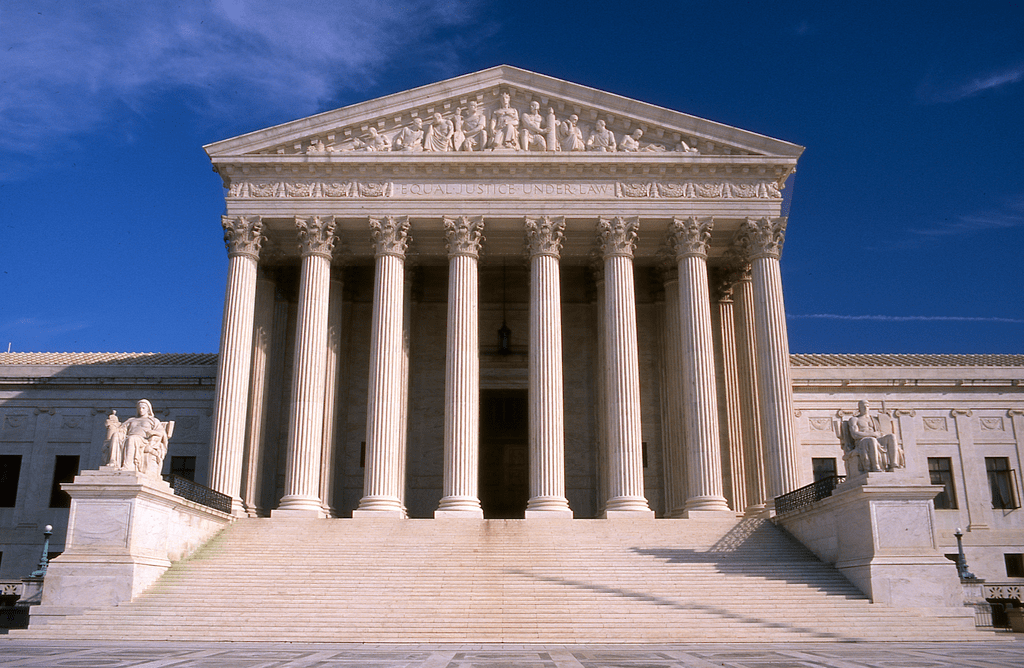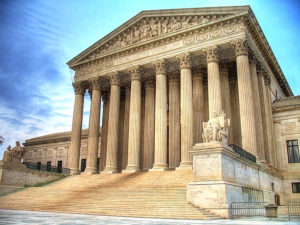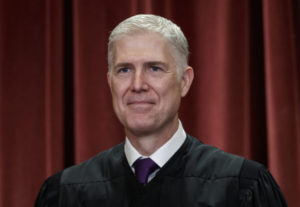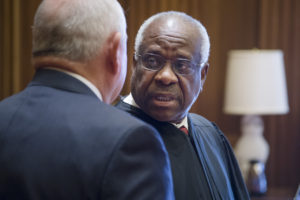Supreme Court Wraps Term With Anthony Kennedy’s Retirement and a Rash of Right-Wing Rulings
Here’s your recap of the jurisprudential carnage. The Supreme Court building in Washington, D.C. (Jeff Kubina / Wikimedia)
The Supreme Court building in Washington, D.C. (Jeff Kubina / Wikimedia)
The U.S. Supreme Court concluded its term this week not with a whimper but a right-wing bang, handing down major decisions on racial gerrymandering, abortion, the Trump travel ban and public employee unions. Each case was decided 5-4 along ideological lines, with Trump appointee Neil Gorsuch, who replaced Antonin Scalia on the bench last year, voting with the conservative majority.
In another late-breaking development, Anthony Kennedy, the court’s perennial swing voter, announced his retirement Wednesday.
Here’s your recap of the jurisprudential carnage:
Public Employee Unions: Janus v. American Federation of State, County, and Municipal Employees, Council 31
On Wednesday, in a decision written by Justice Samuel Alito, the court dealt public sector unions a crippling blow. The ruling overturned the “fair-share” system the unions had relied on for more than 40 years to collect fees from non-union government employees. The outcome was expected, given the animus toward unions expressed by the Roberts’ court in recent years.
Under current law, no one can be forced to join a union, even one that has been elected by a majority of workers in a bargaining unit to negotiate on their behalf. In non-right-to-work states, however, unions nonetheless can collect “fair-share fees” from workers who don’t join, to help pay for the costs of bargaining. Fair-share fees cannot be used to pay for contributions to political campaigns or most lobbying.
Conservatives nonetheless argue that requiring non-union public employees to pay fees to a union they don’t want to join, even on issues of pay and benefits, amounts to compelled speech in violation of the First Amendment.
In a 1977 decision dealing with government unions, one handed down during a more labor-friendly era in the court’s history—Abood v. Detroit Board of Education—the Justices upheld the constitutionality of fair-share fee systems.
But the Roberts court, operating in a new era of hostile anti-worker judicial activism, has steadily chipped away at the Abood rule. Starting with its 2012 opinion in Knox v. SEIU and continuing with its 2014 decision in Harris v. Quinn, the court has emphasized that the payment of union dues by public employees is a form of political speech subject to the constraints of the First Amendment.
In 2016, after Scalia died, the court deadlocked 4-4 in another case, Friedrichs v. California Teachers Association, involving a fair-share appeal. That issue now has been resolved.
“It is hard to estimate how many billions of dollars have been taken from nonmembers and transferred to public-sector unions in violation of the First Amendment,” Alito rued in his ruling. “Those unconstitutional exactions cannot be allowed to continue indefinitely.”
There are currently 22 non-right-to-work states across the nation, which permit fair-share fees to be deducted from employee paychecks. They include both New York and California, the states with the highest number of unionized public employees. Nationwide, the public sector boasts a unionization rate of 34.4 percent, while the private sector rate has dwindled to 6.5 percent.
The Janus decision will effectively turn the country’s entire public sector into a right-to-work jurisdiction. Many labor activists fear it will drain union coffers and ultimately eviscerate public employee unions—the last bastion of organized labor in America.
Racial Gerrymandering: Abbott v. Texas
In its landmark 1962 ruling in Baker v. Carr on reapportionment and redistricting, the Supreme Court established the doctrine of “one person, one vote”—the equal protection principle that electoral districts must be roughly the same in population.
In subsequent cases, the court went further, proscribing “racial gerrymandering”—the practice of purposely designing electoral districts to dilute the voting power of minorities. Whether a given legislative map is an unconstitutional racial gerrymander, however, depends on the specific facts and circumstances of each case, and, sadly, the political orientation of the justices of the Supreme Court.
On Monday, with Alito writing for the majority, the court’s five Republicans reversed a lower-court finding of intentional discrimination against Hispanic and black voters. Alito’s opinion validated Texas’ voting maps with the exception of a single state legislative district, which he conceded was a racial gerrymander.
According to the New York-based Brennan Center for Justice, the decision will have broad ramifications for the entire country, making it harder to challenge “not only redistricting plans but a whole host of other discriminatory voting laws, ranging from voter ID laws to cutbacks in polling place hours.”
On Monday, the Supreme Court also declined to hear a political gerrymandering appeal from North Carolina on the merits, after taking similar action earlier in cases from Wisconsin and Maryland. To date, the court has never invalidated a state legislative map as an illegal political, or partisan, gerrymander.
Abortion: National Institute of Family and Life Advocates v. Becerra
In 2015, California passed the Reproductive Freedom, Accountability, Comprehensive Care, and Transparency Act, or “FACT Act,” requiring anti-abortion “crisis pregnancy centers” to make certain disclosures to their patients seeking pregnancy-related services and advice. It says centers with medical licenses and doctors and nurses on staff must inform patients that the state provides free or low-cost contraception, prenatal care, and abortion services. Unlicensed facilities must disclose they have no medical personnel in house.
According to the state, the FACT Act is designed to guarantee informed consent on the part of patients faced with critical reproductive decisions. It takes aim at what defenders of the act claim is deceptive advertising that undermines and confuses women about their treatment options.
Two centers, one licensed and the other unlicensed, sought a preliminary injunction against the act, along with the National Institute of Family and Life Advocates, a nonprofit corporation from Fredericksburg, Virginia, that operates some 1,400 anti-abortion facilities nationwide. Together, they argued that the act abridges the First Amendment by compelling the centers to convey a pro-abortion message on behalf of the state.
In 2016, the 9th Circuit of Appeals rejected those arguments. But on Tuesday the Supreme Court, in a majority opinion drafted by Justice Clarence Thomas, reversed this, saying the FACT Act “imposes a government-scripted disclosure requirement” that violates the First Amendment.
In a tweet, NARAL Pro-Choice America condemned Thomas’ handiwork for “saying it’s more important that fake women’s health centers be allowed to lie than to provide women w/medically accurate info.”
The Travel Ban: Trump v. Hawaii
On Tuesday, in an opinion written by Chief Justice Roberts, the court upheld the third version of Trump’s travel ban, rejecting Hawaii’s contentions that the ban violated provisions of the Immigration & Nationality Act. In Roberts’ view, the ban was a legitimate exercise of the President’s national security powers.
The ban, unveiled last September, restricts entrants from six predominantly Muslim countries, along with North Korea and government personnel from Venezuela. Although clearly directed against Muslim immigration, it is less restrictive than the ban’s earlier iterations.
The original ban, issued in January 2017, stopped citizens from seven Muslim nations from entering the United States for 90 days, indefinitely barred refugees from Syria, and put a 120-day hold on all others, except for some members of religious minorities (i.e., Christians). The second ban dropped Iraq from the list of targeted nations and removed the exception for religious minorities.
Writing in dissent, Justice Sonia Sotomayor blasted Roberts’s opinion for leaving “undisturbed a policy first advertised openly and unequivocally as a ‘total and complete shutdown of Muslims entering the United States’ because the policy now masquerades behind a façade of national-security concerns.” She also compared the majority opinion to the court’s infamous 1944 ruling, Korematsu v. United States, upholding the wartime internment of Japanese Americans.
As bad as the last week was, it may only be a taste of more to come next term and beyond as Gorsuch settles into his role as a conservative ideological stalwart. And now that Kennedy has retired, President Trump will get to nominate his replacement. For progressives, it can’t get much worse.
Your support is crucial…With an uncertain future and a new administration casting doubt on press freedoms, the danger is clear: The truth is at risk.
Now is the time to give. Your tax-deductible support allows us to dig deeper, delivering fearless investigative reporting and analysis that exposes what’s really happening — without compromise.
Stand with our courageous journalists. Donate today to protect a free press, uphold democracy and unearth untold stories.





You need to be a supporter to comment.
There are currently no responses to this article.
Be the first to respond.